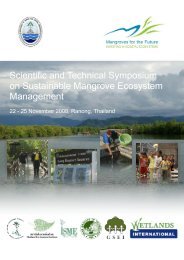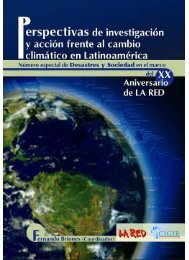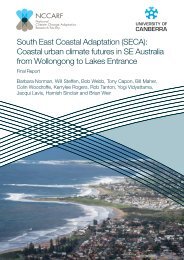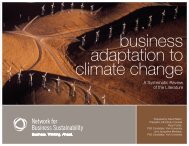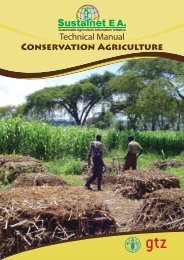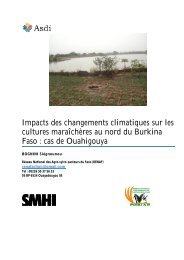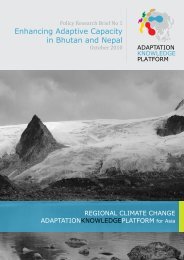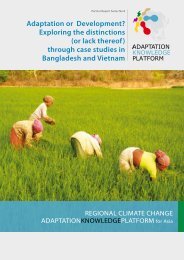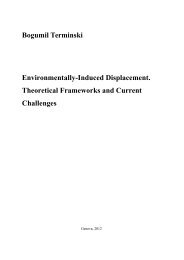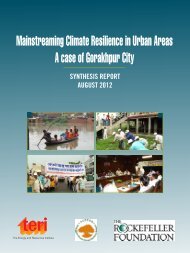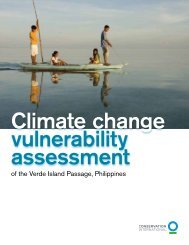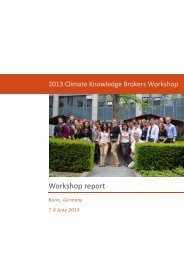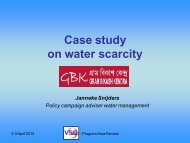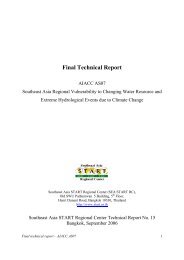Urban food security, urban resilience and climate change - weADAPT
Urban food security, urban resilience and climate change - weADAPT
Urban food security, urban resilience and climate change - weADAPT
Create successful ePaper yourself
Turn your PDF publications into a flip-book with our unique Google optimized e-Paper software.
1. a review of the literature: on notions of <strong>food</strong> <strong>security</strong> <strong>and</strong> related conceptssuch as <strong>food</strong> sovereignty; on current patterns of <strong>urban</strong> agriculture <strong>and</strong> itscontribution to the consumption profile of <strong>urban</strong> populations; the impact of<strong>climate</strong> <strong>change</strong> on these patterns of <strong>urban</strong> agriculture <strong>and</strong> on possible futurepatterns; <strong>and</strong> on broader conceptions of <strong>urban</strong> <strong>resilience</strong> <strong>and</strong> how <strong>urban</strong>agriculture might contribute to the strengthening of <strong>resilience</strong> in cities.2. a series of interviews with practitioners <strong>and</strong> policy makers in two case studycities in Australia: Melbourne <strong>and</strong> the Gold Coast. These case study areaswere selected to reflect different historical trajectories <strong>and</strong> patterns of <strong>urban</strong>growing. They also reflect a different set of opportunities <strong>and</strong> constraints onthe potential for <strong>urban</strong> agriculture to play a more prominent role in thefuture.Research findingsLiterature reviewThere is increasing concern about the vulnerability of our growing cities to anumber of factors, including peak oil, global economic crises <strong>and</strong> <strong>climate</strong><strong>change</strong>. Each of these is likely to have profound effects on the <strong>security</strong> of <strong>urban</strong><strong>food</strong> supplies. Recent disasters, especially floods, have highlighted the fragilityof <strong>food</strong> supply lines in Australian cities.As more of the world’s population lives in cities, questions of <strong>food</strong> <strong>security</strong> <strong>and</strong><strong>food</strong> sovereignty increasingly take on an <strong>urban</strong> dimension. While much debateis concerned with how to produce enough <strong>food</strong> for a growing <strong>urban</strong> population<strong>and</strong> how to secure lines of supply from often rural places of production to <strong>urban</strong>places of consumption, greater attention is now also being paid to theproduction of <strong>food</strong> within <strong>urban</strong> areas.Food <strong>security</strong> is typically defined in terms of access to <strong>food</strong> as well as to itsaffordability <strong>and</strong> availability. Related concepts are also used increasingly inpolicy <strong>and</strong> other debates, including <strong>food</strong> sovereignty, which promote a rightsbasedapproach to the ownership <strong>and</strong> control of <strong>food</strong> systems.The production of <strong>food</strong> within <strong>urban</strong> areas is an important component of <strong>urban</strong>agriculture, along with systems of <strong>food</strong> processing, distribution <strong>and</strong> sale. Themanagement of waste from these processes is also an important element in thisbroad conception of <strong>urban</strong> agriculture.While the nutritional impacts of backyard <strong>and</strong> small scale <strong>food</strong> production incities may be relatively modest at present, they generate a number of otherbenefits, including the chance to become more aware of the provenance <strong>and</strong>quality of fresh fruit <strong>and</strong> vegetables, the opportunity to work with others inproducing, processing <strong>and</strong> sharing local <strong>food</strong> <strong>and</strong> the ability to use what wouldotherwise be waste products that are costly to dispose of.There is scope, therefore, for <strong>urban</strong> agriculture to make an importantcontribution to <strong>urban</strong> <strong>food</strong> <strong>security</strong>. This can in turn help build <strong>urban</strong> <strong>resilience</strong><strong>and</strong> sustainable forms of <strong>urban</strong> life. However, to maximise its contribution <strong>and</strong>impact, <strong>urban</strong> agriculture must be integrated into broader <strong>food</strong> systems <strong>and</strong> intomore comprehensive programs of metropolitan planning for <strong>resilience</strong> <strong>and</strong>sustainability.<strong>Urban</strong> <strong>food</strong> <strong>security</strong>, <strong>urban</strong> <strong>resilience</strong> <strong>and</strong> <strong>climate</strong> <strong>change</strong> iv



